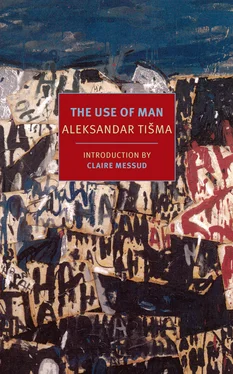Aleksandar Tišma - The Use of Man
Здесь есть возможность читать онлайн «Aleksandar Tišma - The Use of Man» весь текст электронной книги совершенно бесплатно (целиком полную версию без сокращений). В некоторых случаях можно слушать аудио, скачать через торрент в формате fb2 и присутствует краткое содержание. Год выпуска: 2014, Издательство: NYRB Classics, Жанр: Современная проза, на английском языке. Описание произведения, (предисловие) а так же отзывы посетителей доступны на портале библиотеки ЛибКат.
- Название:The Use of Man
- Автор:
- Издательство:NYRB Classics
- Жанр:
- Год:2014
- ISBN:нет данных
- Рейтинг книги:5 / 5. Голосов: 1
-
Избранное:Добавить в избранное
- Отзывы:
-
Ваша оценка:
- 100
- 1
- 2
- 3
- 4
- 5
The Use of Man: краткое содержание, описание и аннотация
Предлагаем к чтению аннотацию, описание, краткое содержание или предисловие (зависит от того, что написал сам автор книги «The Use of Man»). Если вы не нашли необходимую информацию о книге — напишите в комментариях, мы постараемся отыскать её.
A work of stark poetry and illimitable sadness,
is one of the great books of the 20th century.
The Use of Man — читать онлайн бесплатно полную книгу (весь текст) целиком
Ниже представлен текст книги, разбитый по страницам. Система сохранения места последней прочитанной страницы, позволяет с удобством читать онлайн бесплатно книгу «The Use of Man», без необходимости каждый раз заново искать на чём Вы остановились. Поставьте закладку, и сможете в любой момент перейти на страницу, на которой закончили чтение.
Интервал:
Закладка:
He was losing her, and for him that process of loss was both a cause for despair and a cause for perverse pleasure, for perhaps, he thought superstitiously, it absolved him of the guilt of having married a woman unworthy of him. Sometimes he would get angry and, to remind her of her marital obligations, would force her to stay with him while the child in the next room cried — it was as if he sensed exactly when to start, anticipating the moment she would become unfaithful to him — but a few such episodes sufficed to estrange her from him completely, his embraces became repulsive to her, and she avoided them even when the child gave no cause for her to do so. Kroner understood that he no longer had a wife. The woman for whom he had paid the price of his humiliation, of his fall, was abandoning him. Now, to atone for his actions, he slipped even further down the same slope on which he had found her — by becoming a regular visitor to Olga Herzfeld’s “establishment.”
Olga Herzfeld was a Jewess, but an emancipated Jewess. Her husband, a freethinker and Esperantist, much older than she, had left her childless and accustomed to an independent life. In place of motherhood she developed a penchant for organizing and facilitating amorous trysts. For this she felt herself a benefactress, as if she were not being paid for her services. Consequently she was upset by any departures from the standards of behavior she expected from those who made use of her good offices. Every girl she took into her double-fronted residence and gave one of its large, gloomy, chilly rooms was obliged to play the role of wife-mistress to the hilt: to be a good cook and housewife but, whenever it was demanded of her, to show brazen proof of her femininity and passion.
Madame Herzfeld hoped that her temporary boarders would make miraculous conquests of their gentlemen callers, who in gratitude would then shower her, Olga, with presents and attention. Instead, her boarders were lazy, slovenly, and often, when she asked one of them to leave, she discovered that the woman had been stealing from her for some time. They promised everything when they came to her, usually needing money urgently — for an abortion, say, or to repaint their apartment — but as soon as they saw that it was not possible to earn large sums quickly, or as soon as they had taken care of their immediate needs, they left her in the lurch, exactly as their clients, who proved generous only before taking their pleasure, did to them.
Such was the gist of the complaints Olga presented at length to Kroner, her honorable and proper compatriot, while waiting in the semidarkness for an assignation with one of the unfamiliar ladies from town who was late, or shortly following an assignation and during the arrangement of the next, which put them in each other’s company, contented, and with time on their hands.
They did not notice the shadows lengthening around them, for their conversation grew more profound than the shadows. Indeed, they went into the most intimate details. Kroner quite openly pointed out the women who especially pleased him, describing the exact physical qualities that made them attractive to him; and she, in turn, told him of her early marriage to the elderly Herzfeld, who, preoccupied with his humanitarian principles, had failed to satisfy her either as a wife or as a young woman of poor background desirous of moving up in the world. The two understood one another — not needing to speak in complete sentences, for often a facial expression, a gesture, or a potent word in Yiddish sufficed to convey a whole scene, a situation. These tête-à-têtes gave voice to a vaguely common past that both separated them from the rest of the world and brought them closer to one another.
Sometimes during the course of the conversation there was even physical contact between them. Madame Herzfeld, short and fleshy, with thinning, straw-colored hair and a small pointed nose, would lean forward in her armchair, and her plump warm hand would take hold of Kroner’s, which lay on his knee. Then the rest of her would follow, pulling him down onto her, onto the floor and between her heavy breasts, across which her housecoat would suddenly, miraculously open wide. After they coupled rapidly, they got up, went one at a time to the bathroom to wash themselves, then came back and, lighting cigarettes, resumed their conversation as if nothing had interrupted it. This short-lived joining of bodies in no way interfered with their friendship; on the contrary, it seemed to strengthen it. Kroner carried on with his descriptions of the charms of other women, and Madame Herzfeld continued to recommend certain partners and dissuade him from others as if only these intimacies gave her the insight into the finer details of his desires.
7
Once, just before the war, Sredoje Lazukić, too, found his way to Madame Herzfeld’s house, which in Novi Sad marked the high point of his achievement among the tortuous ways of love for money. Indeed, in that sphere of activity, the house was foremost in the town, perhaps even represented, if pleasure in love can be accepted as the most powerful of all experiences, a summit for the whole of Novi Sad. Truly, what could surpass it? Balls, dances, even those of the most select company, the doctors’ or the journalists’? Or church services, in the fifteen or twenty churches in the town — Orthodox, Catholic, Protestant, and the denominations with fewer followers, like the Jewish and Armenian, as well as sects like the Adventists, the Anabaptists, and who knows what else — all calling themselves into doubt by their very diversity? Or learning, nurtured in two high schools — one for girls, one for boys — and in two or three vocational and business schools under the direction of teachers for whom their posts meant assured daily bread after the starvation of their student days? (Not to mention all the voluntary groups and classes, of which one was mentioned in Fräulein’s diary, likewise hotbeds of doubtful, haphazardly undertaken learning distorted by prejudice.) In all these noble pursuits, too, were hidden the temptations of the flesh, infecting them with a lust for money and power that inevitably and quickly, in the restricted circumstances of a small community at the crossroads of Pannonia and the Balkans, exhausted itself in disappointment and self-ridicule.
To prey on others or be preyed upon, to use or be used, if this was the range of possibilities for inflamed desires, then it was certainly easier, and more direct, to translate them into sensual pleasure, into games of cards and beer-drinking under the shade of trees in summer or in a warm, well-lit tavern in winter, into marbled meat, warm potatoes, cold watermelon, fragrant wine, woolen underwear, and lined shoes.
What else was there? Boredom, which caresses you like a blind and bloated rich aunt? Streets on which nothing happens, until, say, a cat jumps out of a cellar window and runs across the road, surprised by a maid with a lighted candle and a basket for firewood. That maid with the basket is the only thing that might break the boredom. Her body leaning forward, the quivering light distorting her cheek, her forearms. A woman. While women long for men and cunningly, almost imperceptibly, entice them toward their sex by scent and movement, men, more impatient, simply buy them.
To Herzfeld’s establishment went local government dignitaries, those who summoned their employees by pressing buttons on their desks. The biggest mill owner came, once at eleven o’clock at night, after his card game with the same male friends and before going home; the local landowner, too, handsome and elegant, so proud that not even the theaters and taverns in Belgrade could entice him to cross the Danube, since, for him, Central Europe ended right in Novi Sad. At Madame Herzfeld’s they all laid aside their vanity and greed; a touch of youth and smooth pink skin beneath their fingers intoxicated them, and for a moment or two they forgot that one day they would all be dead, rotting in the ground, no matter what they did or achieved now above it. That same forgetting — of self, of death — was present even in Sredoje Lazukić’s amorous ecstasies, although his youth kept him from being conscious of it.
Читать дальшеИнтервал:
Закладка:
Похожие книги на «The Use of Man»
Представляем Вашему вниманию похожие книги на «The Use of Man» списком для выбора. Мы отобрали схожую по названию и смыслу литературу в надежде предоставить читателям больше вариантов отыскать новые, интересные, ещё непрочитанные произведения.
Обсуждение, отзывы о книге «The Use of Man» и просто собственные мнения читателей. Оставьте ваши комментарии, напишите, что Вы думаете о произведении, его смысле или главных героях. Укажите что конкретно понравилось, а что нет, и почему Вы так считаете.












